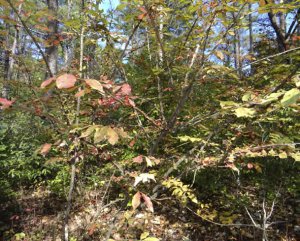AgEBB-MU CAFNR Extension
Green Horizons
Volume 24, Number 2
Spring 2020
Ceasing the Sale of Invasive Plants:
New Initiative Aims to Stop Invasive Plant Problems Before they Start
Carol Davit and Tina Casagrand
As tree farmers know, non-native, invasive plants can threaten the growth of trees, the profitability of tree harvests, and the forest products industry overall. More broadly, invasive plants negatively impact native plant health and biodiversity in both agricultural and natural systems in Missouri. Outdoor recreation including hunting, fishing, and hiking-and the money that the outdoor industry generates-can also be negatively affected.
The Missouri Invasive Plant Task Force (MoIP) seeks to stop many invasive plant problems not only for tree farmers-but for all Missourians-before they start. This year, MoIP is seeking stakeholder involvement for ceasing the propagation, sale, and intentional distribution of invasive plants in our state. Following robust input from the agriculture, horticulture, conservation, and other sectors, MoIP will seek legislative support.
The MoIP Invasive Plant Assessment
When it began five years ago, the first priority for MoIP was to create a comprehensive list of existing and potential invasive plant species in Missouri, and to rank this list according to the invasive nature of each plant. This list, completed and made public in February 2019, is the foundation upon which MoIP's Cease the Sale initiative was created.
Creating the list and ranking it was a multi-year effort. Starting with its network of local, state, and federal agencies and private industries, MoIP sought input from experienced field biologists in Missouri to rank a list of 142 invasive species, compiled largely by MoIP member Dr. Quinn Long, the director of Shaw Nature Reserve. MoIP sent detailed ranking guidelines to reviewers, along with a detailed spreadsheet to complete with their observations. The guidelines are available at the MoIP website (moinvasives.org), to consult.
MoIP received 26 reviews, which ranked each species in each of Missouri's primary ecological regions according to the following:
- Impact: level of severity of the species on natural communities in each of Missouri's primary ecologicalregions
- Current abundance: 10s of plants? 100s? 1,000s?
- Trends in distribution and abundance: estimation of how rapidly a species' range will expand to form new occurrences over the next 10 years, based on the reviewers' observations and knowledge of specific regions
 |
Above: In 2018, the Missouri Invasive Plant Task Force (MoIP) organized a field event in Columbia, MO to call attention to the invasive nature of Callery pear (Pyrus calleryana; Bradford pear and other cultivars), which is readily available for purchase from many outlets. |
The ranked list of 142 species is available at moinvasives.org, and maps illustrating impact, abundance, and trends are available for each species. MoIP is currently developing technology to update the list and maps in real time, with ongoing reviewer input.
Ceasing the Sale of Invasive Plants
Private property owners, communities, farmers, business owners, public utilities, and tax-supported state and federal agencies suffer economic losses controlling invasive species. While many people are exerting effort to control invasive plants on the ground, currently no rules exist to stop the ongoing sale of known invasive plants in the state. As Missourians have seen in one recently popular example of the Callery (Bradford) pear invasion, even plants thought to be sterile are exhibiting significant invasive characteristics in the field and are having devastating impacts.
In an effort to stop invasive plant problems before they start, MoIP is proposing a new rule prohibiting the sale, intentional distribution, and propagation of any living part of a known invasive plant. Many states, including Indiana, Ohio, and Maryland have recently passed rules of this nature, for the benefit of agricultural, horticultural, silvicultural, and other interests of their states.
Many Missourians are familiar with the state Noxious Weed Law, which both requires property owners to control noxious weeds on their property and prohibits noxious weeds from being sold. Violation of either of these provisions is subject to penalty by county prosecutor. The state designates 12 species of weeds as noxious. Currently, adding a plant to the Noxious Weed Law list requires review and approval by the Missouri Department of Agriculture.
To create a new designation of plants that are banned from sale (but neither penalizes property owners for presence of invasive plants, nor requires them to treat or remove those invasive plants) would require changing statutes through the legislative process. For example, Indiana and Ohio recently enacted new state rules for invasive plants that are separate from their Noxious Weed Laws
 |
The Missouri Invasive Plant Task Force (MoIP) defines "invasive" as an aggressive, non-native plant whose presence causes or is likely to cause economic harm, environmental harm, or harm to human health. For example, burning bush (Euonymous elatus), pictured above, is spreading beyond developed areas where it has been planted and is invading many wild areas in Missouri, including this lower Ozarks woodland. Burning bush is widely available for sale. |
The rule MoIP is pursuing is different than the Noxious Weed Law in this significant way: the rule would cease the propagation, sale, and intentional distribution of invasive plants in our state, but it would not penalize property owners for the presence of a known invasive plant. This proposed rule would be complementary to-not a replacement or alteration of-the Noxious Weed Law.
Esatblishing a "Cease the Sale" Statute Enforcement
After obtaining rigorous stakeholder review, MoIP intends to work with the Missouri Department of Agriculture-which is a MoIP stakeholder-and state lawmakers to establish statute language, the proper jurisdiction for legal authority, and penalties. While some exceptions will be necessary, such as transferring invasive plants for research purposes, statute language will state that a person may not intentionally propagate, import, transfer, sell, purchase, or introduce any viable part of an invasive plant in the state. These restrictions do not apply to the transfer, lease, sale, or purchase of real property on which an invasive plant is already established. MoIP is also exploring options for possible declassification protocols.
Some plants, particularly in the ornamental trade, require multi-year upfront investment before selling to the public. Interested stakeholder groups are invited to recommend a "phase out" period of time during which existing stock of certain invasive plant species may still be legally sold after the rule is passed. MoIP will provide lists of alternative native and non-invasive non-native plants with which to replace restricted invasive plants in commerce.
If you belong to an agroforestry or other group that would like to review MoIP's ranked assessment of invasive plants to be considered under a new Missouri Cease the Sale rule, please contact Tina Casagrand at info@moinvasives.org.
 |
Carol Davit is the executive director of the Missouri Prairie Foundation and chair of the Missouri Invasive Plant Take Force. Tina Casagrand is an independent contractor who coordinates MoIP's work. |
